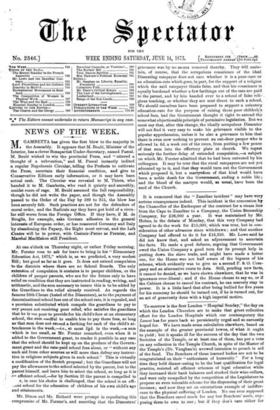At one o'clock on Thursday night, or rather Friday morning,
Mr. Forster rose to ask for leave to bring in his "Elementary Education Act, 1873," which is, as we predicted, a very modest Bill; but good as far as it goes. It does not extend compulsion to the districts where there are no School Boards. The only extension of compulsion it contains is to pauper children, or the Children of pauper parents, who are for the future only to have relief on condition that they are instructed in reading, writing, and arithmetic, and the HUM necessary to insure this is to be added by the Guardians to the relief already received. As regards the famous 25th Clause (hated of the Dissenters), as to the payment of denominational school fees out of the school rate, it is repealed, and a provision substituted which compels the guardians to pay to any parent not receiving poor relief, who satisfies the guardians that he is too poor to provide for his child's fees at an elementary school, the sum needful to enable him to pay these fees, so long as that sum does not exceed a farthing for each of the child's at- tendances in the week,—i.e., at most 2fd. in the week,—a sum which is too small, as Mr. Forster remarked, even when it is added to the Government grant, to render it possible in any case that the school should be kept up on the produce of the Govern- ment grant and the rate-paid school fees alone, or "without any such aid from other sources as will more than defray any instruc- tion in religious subjects given in such school." This is virtually a modification of the Scotch proposal ; but the Guardians will not pay the allowances to the school selected by the parent, but to the parent himself, and leave him to select the school, so long as it is D" efficient school,—for by Section 23 the parent is compelled to
in case his choice is challenged, that the school is an effi- ..,,ent school for the education of children of his own child's age and attainments.


































